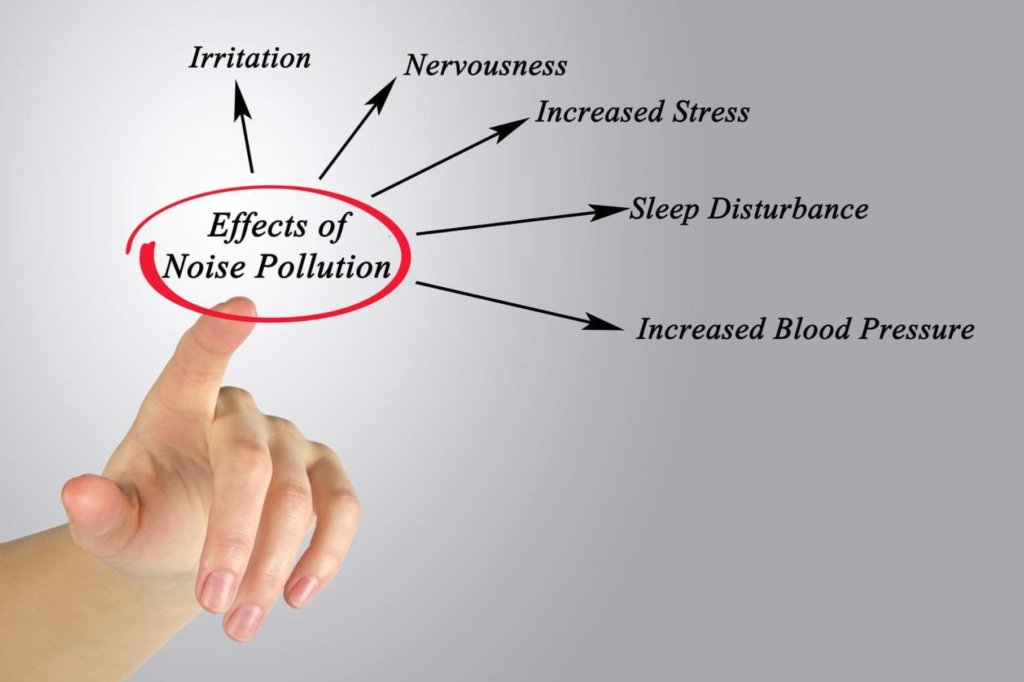
“Sound may be a great healer, but noise sure isn’t. Jets roaring overhead, music pounding through your apartment walls, your 20 year old refrigerator chugging in the kitchen, even a computer or television screen whining at a frequency you can barely hear may be causing health problems, experts say.
“Noise is a hazard,” says Steven Halpern, Ph.D., composer, researcher and author of Sound Health: The Music and Sounds That Make Us Whole. “And the scary part is that it doesn’t even have to be at the point where it’s hurting your ears. Even if your hearing isn’t affected, the rest of you may be.”
The effects of noise pollution
Evidence is mounting that noise pollution may be linked to high blood pressure, stress, lack of concentration, irritability and many more symptoms. The case is growing so strong that former U.S. Surgeon General William H. Stewart says that “calling noise a nuisance is like calling smog an inconvenience.”
Excessive noise may increase your risk of high blood pressure and other cardiovascular problems by as much as 10 percent, according to Shirley Thompson, Ph.D., associate professor of epidemiology at the University of South Carolina School of Public Health in Columbia. The reason for this isn’t fully understood, but some researchers believe unpleasant sounds may trigger your body’s fight-or-flight response, says Redford B. Williams, M.D., professor of psychiatry and director of the Behavioral Medicine Research Center at Duke University Medical Center in Durham, North Carolina.
When your body senses danger, it produces adrenaline and the hormone norepinephrine, which can speed up your heart and send more blood to your muscles. If you don’t do anything with all of this extra body energy, it can strain your blood vessels and possibly cause high blood pressure in the long run, Dr. Williams says.
Women may be at even greater risk than men. That’s because they can hear higher frequencies, such as those coming from computers and television sets, says Caroline Dow, Ph.D., associate professor of communication at the University of Evansville in Indiana. She studied 100 college-age women and found that those exposed to high-frequency computer noise scored 8.5 percent worse on a standardized test than women who didn’t have to contend with the sound.

So how do you nix all of this extra noise?
Try wearing soft-foam earplugs that are designed to reduce sound by at least 20 decibels, says Ernest A. Peterson, Ph.D., professor emeritus at the University of Miami School of Medicine. The federal Occupational Safety and Health Administration requires workers to wear ear protection if they are exposed to noise at 89 decibels or more. For comparison, you’re exposed to between 42 and 49 decibels sitting in your living room holding a conversation- and to about 130 decibels or above at a rock concert. Earplugs are available in most drugstores and shouldn’t cost more than a few dollars.
You can also reduce noise in your home with a few simple tricks. Use a rake instead of a leaf blower. Let your hair dry naturally once in a while instead of using a blow-dryer. Put appliances such as washing machines on rubber cushions, which help absorb the sound. And try adding carpets and drapes, which tend to muffle sounds that rattle off bare walls and floors.
Nature Sounds & White Noise

If you can’t eliminate a sound, you can at least try to mask it with a more pleasant sound. Try some soft, soothing music, says psychotherapist and stress management expert Emmett Miller, M.D., of Menlo Park, California. Play it just loud enough to block whatever other sounds you hear. Or try seeking out the sounds of nature, even if you have to buy a tape that mimics rainfall on a roof or a rushing mountain stream.
One final alternative is a white noise machine, a gadget that emits sounds designed to nullify other background noise. You can put one anywhere in your house or office or carry it on the road if you have to sleep or work in a noisy environment. Dr. Halpern says these machines usually cost between $50 and $150 and are greatly available online and in electronic stores.
“It’s better to eliminate the source of the noise,” he says. “But if that’s not possible, I’d rather listen to the white noise than to something more annoying.”
~ New Choices in Natural Healing
